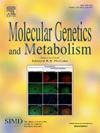先天性糖基化障碍gmppa的表型和基因型描述:附26例报告
IF 3.5
2区 生物学
Q2 ENDOCRINOLOGY & METABOLISM
引用次数: 0
摘要
先天性糖基化障碍(congenital Disorder of Glycosylation, CDG)是一种由影响n -连锁糖基化途径的GMPPA致病变异引起的超罕见常染色体隐性CDG。受影响的个体表现为三个主要症状:失弛缓症、白斑和婴儿期智力发育受损。目前GMPPA-CDG的管理是针对患者的症状。迄今为止,已有23人被报道患有GMPPA-CDG。本文对报道的23例患者的临床、生化和遗传学特征进行了综述,并增加了3例GMPPA-CDG患者。我们还描述了3例患者口服n -乙酰氨基葡萄糖(GlcNAc)补充的效果。除了先天性口疮、失弛缓症和发育/智力障碍外,我们还注意到这些患者还有各种生长障碍、面部畸形、角化过度、多汗症、口腔畸形和听力缺陷。在GlcNAc治疗下(4-6 g/天),我们注意到我们的3例患者泪液生成有所改善。鉴于其对不同发育途径的影响,我们强调需要对这种多系统疾病进行多学科治疗。我们在我们的26例患者队列中未发现基因型/表型相关性。本文章由计算机程序翻译,如有差异,请以英文原文为准。
Phenotypic and genotypic description of GMPPA-congenital disorder of glycosylation: A review of 26 cases
GMPPA-Congenital Disorder of Glycosylation (CDG) is an ultra-rare autosomal recessive CDG caused by pathogenic variants in GMPPA that affects the N-linked glycosylation pathway. Affected individuals present with three major symptoms: achalasia, alacrima, and impaired intellectual development during infancy. Current management of GMPPA-CDG is targeted to address patients' symptoms. To date, 23 individuals have been reported with GMPPA-CDG.
This paper reviews the clinical, biochemical and genetic characteristics of the reported 23 patients and adds 3 patients with GMPPA-CDG. We also describe the effect of oral N-acetylglucosamine (GlcNAc) supplementation in 3 patients.
Besides alacrima, achalasia and developmental/ intellectual disability, we noted in these patients also variable growth impairment, facial dysmorphism, hyperkeratosis, hypohidrosis, anodontia, and hearing deficit. Under treatment with GlcNAc (4–6 g/day), we noted improved tear production in our 3 patients.
Given its effect on different developmental pathways, we emphasize the need for multidisciplinary care for this multisystem disorder. We did not find a genotype/phenotype correlation in our cohort of 26 patients.
求助全文
通过发布文献求助,成功后即可免费获取论文全文。
去求助
来源期刊

Molecular genetics and metabolism
生物-生化与分子生物学
CiteScore
5.90
自引率
7.90%
发文量
621
审稿时长
34 days
期刊介绍:
Molecular Genetics and Metabolism contributes to the understanding of the metabolic and molecular basis of disease. This peer reviewed journal publishes articles describing investigations that use the tools of biochemical genetics and molecular genetics for studies of normal and disease states in humans and animal models.
 求助内容:
求助内容: 应助结果提醒方式:
应助结果提醒方式:


